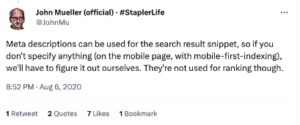Are Meta Descriptions an SEO Ranking Factor?
Meta descriptions are a crucial part of Search Engine Optimisation (SEO). They provide a summary of the web page’s content, providing the user with an overview before clicking. It’s highly recommended webmasters take time to write engaging meta descriptions for each of their pages. However, there has been an ongoing debate about whether meta descriptions directly affect the page’s search engine rankings.
In this article, we’ll answer the question “Are meta descriptions a ranking factor?”. We’ll explore what meta descriptions are, and Google’s official stance, and examine various perspectives on their impact on search rankings.
What is a Meta Description?
A meta description serves as a brief snippet describing a webpage’s content. Its role is to provide search engine users with a preview of what they can expect when clicking on a search result. They’re an HTML attribute that is supposed to summarise a webpage concise and compelling manner, encouraging the user to click on the SERP listing.
Webmasters can optimise meta descriptions to enhance the visibility of their pages’ SERP listings and attract traffic. If a user has two meta descriptions to choose from – a boring and generic one, or a description that’s clearly taken time to craft and leaves the user asking more – which one would they choose?

Google’s Official Stance on Meta Description’s Ranking Power
John Mueller, a coordinator of Google’s Search Relations, is viewed by many as a spokesperson for Google and their complex SEO infrastructure. He’s very vocal on Twitter answering beginner and veteran SEO’s endless queries and concerns. John is also a consistent part of the official Google Search Central YouTube channel.
On both YouTube and Twitter, John Mueller has confirmed that meta descriptions are not considered a ranking factor for Google. If – after spending 100s of hours crafting the perfect meta description for each of your web pages, you’re reading this in disbelief – you can find confirmation of John’s statement on YouTube here, and his Tweet below.
What’s the Point in Meta Descriptions?
If meta descriptions aren’t used as a ranking factor, then we should just forget about them… right?
No. Even though Google states they don’t directly use meta descriptions as a ranking factor, they can be used as an indirect ranking factor. Writing an enticing meta description can significantly increase the click-through rate of your page’s organic search results.
Simply put, well-written meta descriptions can encourage a higher percentage of users to click on your webpage, visit your site, and increase your traffic, regardless of whether your ranking position remains unchanged. If said traffic enjoys your content and sticks around, this is a clear signal to Google that your page should be higher in the SERPs.
By dedicating time and effort to creating compelling meta descriptions, you can effectively capture the attention of potential visitors and maximise the visibility and engagement of your website.
Now You Know
As discussed, meta descriptions serve as a crucial element in attracting users and enhancing the click-through rate (CTR) of your organically ranked web pages.
Despite Google’s official stance that meta descriptions do not directly impact rankings, they can indirectly rankings through CTR. Investing time and effort into crafting engaging meta descriptions remains to be a valuable practice in maximising the engagement of your website’s search results.






